#when that is textually and provably not the case?
Note
Hi! I love your Naruto thoughts and meta posts with all my heart and I want to ask your thoughts on something that has been on my mind literally since I was 13: what do you think about the relationship between Sasuke and Sakura? I went from being a hardcore shipper when I was a teenager, to being against any romantic relationship in Naruto after finishing the anime when I was in my early twenties. Nowadays I'm very into platonic love and depictions of friendship and I think the anime's obsession with forcing the "romantic interest" curse upon the main female character robbed us of... so much. There are a few wonderful moments in the anime where Sasuke and Sakura acknowledge each other, but because she's always "the girl with the crush", her actions are so often interpret as irrational or selfish by the fandom.
Hi @riemmetric! It's great to talk to you again! Sorry it's taken me so long to answer this; RL has been making demands of me lately and it took me way longer to finish writing this up than I wanted it to (then again, I knew from the minute I read your original ask that my reply was going to get long, so I suppose I should have predicted a delay XD)
It's funny, my sister once asked me to choose between Sasuke or Sakura for an “unpopular opinion” meme, and I ended up doing Sasuke solely because I think the negative fandom opinions about Sakura are so unhinged and divorced from the actual text that I wouldn’t even know where to start. People are entitled to dislike whatever characters they want, obviously, but there are some fandom takes that are, for me, so obviously rooted in bad faith viewings/readings that there’s no urge in me to discuss them. That said, since you asked, I’m happy to go into my own thoughts on this a bit, with the disclaimer for other potential readers that I only write about fandom things for my own personal enjoyment, not as a contribution to The Discourse. If you don’t like Sakura, great! I have no interest in changing your mind. Please consider this a sincere invitation to scroll on by and go enjoy whatever parts of the fandom appeal to you.
In general terms: I love Sasuke and Sakura’s relationship as much as I love all of the relationships in Team 7. If we’re talking about them specifically as a romantic couple, then I probably fall somewhere in the middle of the spectrum, because I do like them together in a post-canon (to be clear: non-Boruto) setting, after time has passed and they’ve continued to develop individually and reconnect with each other, but I also wouldn’t exactly call myself an intense “shipper,” in the sense that I have no interest in pulling things out from the text and incorrectly citing them as evidence that Sasuke has hidden romantic feelings for her during the canon period. He cares about her in the canon period, just like he cares about Naruto and Kakashi. That’s not up for interpretation; it’s the text. But Sasuke during the canon time period does not demonstrate specifically romantic interest in anyone.
[A note before people who might ship Sasuke with Someone Else emerge to rail against this statement - please just scroll past and continue enjoying fandom in whatever way is most fun for you. It is cool to ship whatever fanon thing you want; I think that’s great! But earnestly citing any loving or emotional thing Sasuke does re: various characters in this story (yes, Sakura included) as indicative of specifically romantic love isn’t supported by the text. I know there are always going to be enormous subsets of any fandom who insist that it is, and I'm certainly not going to barge into anyone else's space to complain about that (because other people having fun together is harmless and none of my business), but I'm not obligated to indulge it on my own blog, either.]
Anyway, that said - the reason why I love Sakura and Sasuke’s relationship (from here on out I’ll use “relationship” in a general, non-romantic sense) is precisely because Sakura isn’t just “the girl with the crush.” Sakura has an arc when it comes to Sasuke, and its trajectory moves in the exact opposite direction of “irrational” or “selfish.” She specifically goes from “the girl with the crush” to “the girl who steels herself and tries to put her personal feelings for Sasuke aside for the greater good” to “the girl who knows she can’t put her feelings aside, but who also knows full well that Sasuke doesn’t reciprocate them, and who still wants to save him regardless, because he matters to her as a person and a friend.”
[I'm putting the rest of this under a cut to save everyone's dash, and also to emphasize once again that this is a personal post on my personal blog which I wrote in response to a question from a personal acquaintance, the full content of which no one is obligated to read. I am not sending this post to random strangers and forcing them to look at it. I'm not even putting it in the character tags. I'm typing it up on my own blog and putting it under a cut. If you already know that you don't like Sakura, but you still click the link/read the post and then feel an urge to comment and complain, I am going to copy-paste this disclaimer and remind you that I specifically recommended that you scroll past and go have fun with fandom in your own way. Thanks in advance for responsibly curating your own fandom experience!]
So, from the top:
1. the girl with the crush
Sakura is, obviously, completely obsessed with Sasuke at the beginning of Part 1. She’s also deeply clueless about him and his history (bizarre though it is, the story seems to indicate that she initially doesn’t know what happened with his family, the same way young!Obito is initially clueless about Kakashi’s father). But what I like about Sakura and Sasuke’s Part 1 relationship is how this changes over time.
The critical scene that kicks this off happens right at the beginning of the manga, when she and Sasuke are talking by that bench - she complains about Naruto and blames his behavior on him being all alone/having no family to scold him; and even says she’s jealous that he doesn’t have parents to nag him all the time. This obviously triggers an outburst from Sasuke, who tells her she has no idea what loneliness means and that she “makes him sick”/she’s “annoying” (importantly, the exact same thing Sakura said to Naruto in anger earlier that day), which in turn prompts Sakura to reassess herself and wonder whether she’s been making Naruto feel this terrible all the time, too:
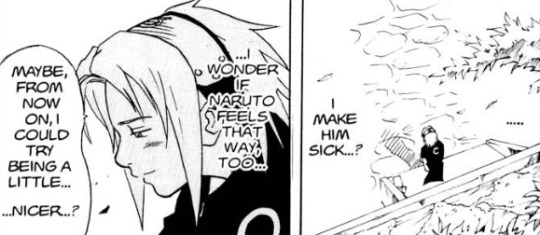
From that point on, it’s a process of her putting little pieces together. She still has a MAJOR crush, and she still acts like a twelve year-old, but as we approach the end of Part I, Sakura actually has a more accurate grasp on Sasuke’s current state of mind than Naruto does. Naruto is initially excited to fight Sasuke on top of the hospital, because he feels like Sasuke’s finally acknowledging him, whereas Sakura is the one who immediately recognizes that something is wrong about this situation. She is also the one who, after this fight, is concerned that Sasuke is really unwell and might do something drastic like run off in pursuit of the power Orochimaru promised him, but when she communicates this to Naruto, he assures her that this would NEVER happen:
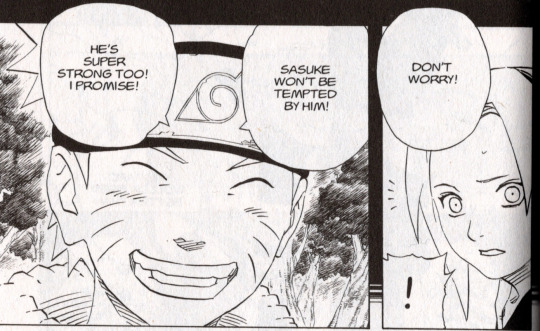
(Sakura isn't convinced, though, because she goes to monitor the exit out of the village anyway.)
I’m not criticizing Naruto for his response here. I ADORE hearing him say that Sasuke is too strong to need Orochimaru, with such perfect confidence - I love seeing how much respect and admiration he has for Sasuke underneath all their fighting, because that’s the whole reason he’s always baiting Sasuke and yelling at him and claiming “you're not so great!” He looks up to Sasuke; he wants to be like Sasuke; he thinks Sasuke is awesome! (It’s that Obito @ Kakashi behavior, you know?) But the fact remains that he is clueless about what’s actually going on with Sasuke in Part 1, and he remains clueless(ly optimistic) for a long time.
(Eg, when he catches up to Sasuke during the retrieval arc and Sasuke climbs out of that cursed seal coffin, Naruto waves at him and calls "Come on, let's go!" as if Sasuke has been successfully rescued and is now going to come running home. Even in Part II, when Naruto hears that Sasuke killed Orochimaru, he beams and immediately says, “So he must be on his way back to the Leaf Village!” And everyone else in the room is like, “....,” because they know better. Naruto doesn’t yet fully understand [or doesn't want to accept] the extent to which Sasuke has willingly chosen this path, and it’s not until after Jiraiya’s death/the Pain attack/the Five Kage Summit that Naruto really starts to understand Sasuke more clearly, which is something he himself admits.)
Sakura, in Part 1, has access to more information about Sasuke - she’s there for his first dissociative monologue during the bells test, she’s there for the curse mark’s placement, she’s there for his first violent transformation in the Forest of Death - she is, in fact, the unwitting catalyst for it (“Sakura…who did this to you?”), and her compassion is the reason Sasuke is later able to overcome the curse mark’s influence - so she has a more accurate/complete picture of “how he’s doing,” for lack of a better phrase, whereas Naruto, who doesn’t know about the curse mark in the first place, is still in the dark. This means that Sakura is able to accurately discern that Sasuke is struggling more than Naruto realizes, and specifically to predict that he’s going to run away.
(This dynamic is then interestingly flipped in the back half of Part II, since at any point after the Five Kage Summit, Sakura doesn’t have access to extremely relevant [if currently questionable and unproven] details that would in any other circumstance inform her behavior).
Of course, just because she has more info in Part 1 doesn’t mean she has some kind of miraculous insight into Sasuke’s every thought and feeling. There are parts of her attempt to convince Sasuke to stay in the village that are as clueless as any of Naruto’s assumptions, and they showcase the kind of magical thinking common to childhood - like when she says that if he stayed with her, she could give him happiness, she’d do anything for him, even help him get his revenge - this idea that she herself can do something to make him feel better, that she can love him powerfully enough to defeat his pain - obviously none of that is rooted in realism.
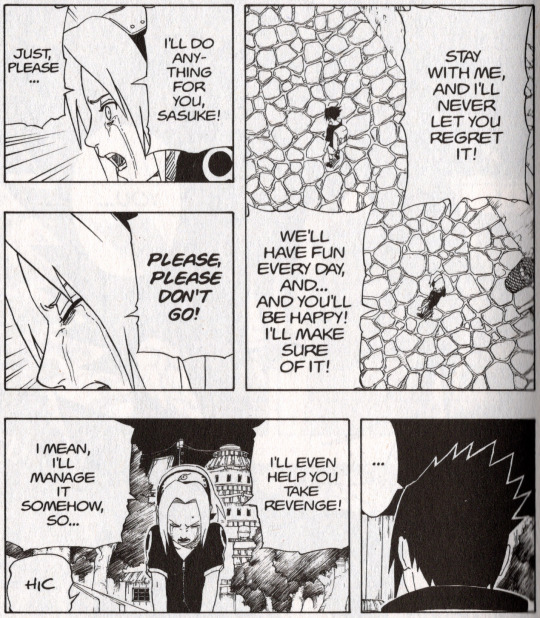
Is this part of her approach irrational and immature and inadvertently self-centered? Of course it is! But it’s no more irrational and immature and inadvertently self-centered than Naruto’s stated plan to drag Sasuke back to the village even if he has to “break every bone in [his] body!”
Hating on Sakura for her Part 1 attempt to convince Sasuke to stay in the village while simultaneously lauding Naruto for his feels like a bad faith misread of what is, to me, pretty clear narrative intention. The story doesn’t at any point intend for us to see her begging him to stay as a selfish or conniving attempt to get something she wants. She’s begging him to stay for the same underlying reason that Naruto is: she cares about him. She thinks he’s making a mistake that will only cause him more pain in the end (she’s right) and she wants to make it so he feels less pain right now (she can’t. But she doesn’t understand that/isn’t able to admit that, and she’s willing to try ANYTHING that might help).
It’s critical that this farewell scene is set in front of that same bench from their first important confrontation - she references that day and how angry he got at her, and this time she tells him that she understands his reaction. She’s learned things and she recognizes how insensitive she was being back then (“I know what happened to your clan, Sasuke”), even though she still can’t fully grasp all the complexities of the situation. She tells him that him blowing up at her back then helped her understand what loneliness actually meant (as opposed to her previous shallow understanding of it), and she challenges him about his choice right now: "So that's it, you're choosing the lonely path?" And when she tells him that she'll be very lonely if he leaves, we're immediately shown a panel of Sasuke thinking of both his friends, with the very clear implication that if he goes through with this, he will be lonely without them, too - that he's still struggling with the idea of leaving them, no matter how hard he tries to pretend:
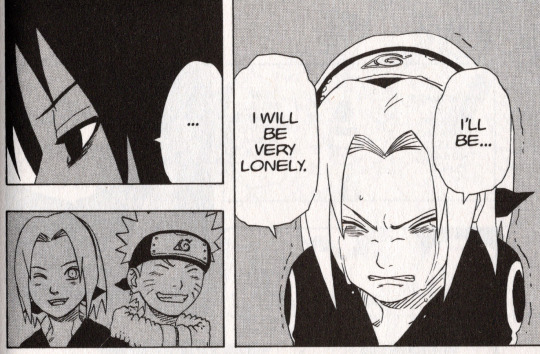
Sakura at this point knows that Sasuke isn’t interested in her the way she is in him, but she still wants to give him happiness, however fantastical and immature her ideas sound to us (and, I’m sure, to him). “I’ll do anything, even help you get your revenge/we'll have fun every day, and...and you'll be happy! I'll make sure of it!” - of course, it’s completely childish. It���s irrational. It’s ridiculous to think that any of this would ever be effective, but no more ridiculous than Naruto’s belief that he can simply break every bone in Sasuke’s body and keep him in the Leaf by force.
Both Naruto and Sakura are children who have a deeply oversimplified understanding of Sasuke’s situation. They both still think they can fix him themselves. They both think they can save him themselves. They both think they can convince (or force) him to do what they want, what they think is in his best interests. Both of them don’t yet understand that he has to want to come back, if it’s ever going to mean anything. Their attempts to keep him in the village are immature and unrealistic, yes. What they aren’t, however, is selfish, because neither Sakura nor Naruto are doing any of this with the intention of advancing their own interests. They’re only thinking about Sasuke - how to keep Sasuke safe, how to make Sasuke happy - even when neither of them are taking an approach that will actually work.
Naruto and Sakura are children. They’re afraid of losing somebody they care about. Their attempts to prevent that from happening are desperate and messy and ultimately ineffective, but they are also genuinely felt and rooted in a true desire to rescue Sasuke from his pain, which - and this is the single most important thing that should impact our viewing of Part 1 - is something that Sasuke RECOGNIZES. He doesn’t spend that agonizingly long moment bowed over Naruto’s defeated body so we can pretend he doesn’t understand that Naruto was just trying to help him. He doesn’t take the time to murmur, “Sakura…thank you,” before laying her out carefully on a bench, just so we can discount it and pretend that he doesn’t recognize and appreciate her genuine intention to make things better for him, however clumsy that attempt might have been.
2. the greater good
If Stage 1 Sakura is "the girl with the crush," then Stage 2 Sakura is a progression to “the girl who decides to put her feelings for Sasuke aside in order to protect innocent people, including (but certainly not limited to) Naruto.” She’s driven to this decision by interactions with Shikamaru, who all too recently had to grow up fast himself (“We're not kids anymore...we can't allow a war to break out between the Hidden Leaf and the Hidden Cloud because of Sasuke") and Sai, who risks his new friendship with Sakura and Team 7 in order to speak some hard truths and deliver one of my favorite lines in the whole story: “I don’t know what promise Naruto made to you, but it’s really no different than what was done to me. It’s like a curse mark.”
(INCREDIBLE. How can anybody be complaining about a season where Sai gets to say something that goes THIS HARD and Sakura LISTENS and takes DRAMATIC ACTION that actually propels the story forward in a meaningful way - )
[Okay, yeah, brief personal opinion interlude - it is just bonkers wild to me that there are people who complain about Sakura in the Five Kage Summit arc. That entire season is the greatest character arc she ever has. Literally she has never been more interesting and dynamic than in Season 10; it’s the first time she ever gets to be as deep and fascinating as the boys; what is everybody so worked up about? Oh, “she lied to Naruto that one time” - Sasuke joined infant-kidnapping baby-murdering human experimentation machine Orochimaru when he was twelve years old in order to (dare I say it????) selfishly pursue his personal goals and yet, somehow, we are still able to root for him. He abandoned his friends/allies to imprisonment and death (Suigetsu and Jūgo) or outright stabbed them in the chest himself (Karin) in order to (SELFISHLY) get what he wanted, and yet, somehow, we are still able to love him, understand him, and be on his side. Naruto is canonically not upset with Sakura about her lie after receiving context for the situation and I think we can probably take our cues from him without feeling the need to bring her up on war crimes; please calm down]
[Sorry, I just really love most of Season 10 and think it’s one of the best examples of how good this story can be when every single character gets to do something that matters (as opposed to things being all Naruto, all the time) so I get a little bit worked up over people complaining about some of the best writing Sakura ever gets. I don’t understand what certain elements of fandom want from her. People complain about her being “useless” and not doing anything that contributes to the story, but then they complain just as much when she does finally get to act decisively and have just as complex/dynamic an inner world as the boys. She’s “weak” for being unreasonably in love with Sasuke, but when she tries to be “strong” and put her love for him aside and eliminate him in order to protect Naruto and the rest of the world, she’s evil, because she should have been more understanding of his situation (despite the fact that she doesn’t KNOW anything about his situation). But then when she can’t go through with killing him after all because she cares about him too much despite the things he’s done, she’s not "compassionate" or "kind" or "a good friend," she’s “weak” again. Nothing Sakura does in S10 is more wrongheaded or rash than any of the batshit, buckwild things Naruto and Sasuke have done in the past (and will continue to do in the future), but when Naruto and Sasuke have big feelings or take bold action, it makes them interesting characters, whereas Sakura can’t breathe in anyone’s direction without being minutely scrutinized for moral impurities.]
Anyway. Back to a more measured response.
Every single piece of development Sakura has with regard to Sasuke in this season satisfies me so much. Her initial shock and disbelief at hearing that Sasuke had joined the Akatsuki? Good, appropriate. The fact that she starts to acknowledge the reality of what Sasuke’s done sooner than Naruto does? Also extremely appropriate, very in-character for both of them. Her taking Sai’s words to heart and deciding that the promise she asked Naruto to make when they were children is causing him to suffer and she has to relieve him of that burden? Juicy! AND thematically significant (promises!!!! the burden that a promise places on a person, especially when it can't be kept - we've seen that before in this story and we'll see it again). Her anguished pivot from wanting to protect Sasuke to realizing that she has a responsibility to protect the countless innocents who will die because of the war he’s trying to start? HELLO THIS IS INCREDIBLE CHARACTER DEVELOPMENT. Her knocking out the classmates who agreed to help her so they don’t have to share in her burden (and so the only person Naruto will hate when it’s over is her)? BRUH. Her being so committed and focused on her goal of saving innocents and protecting Naruto (not just from being harmed by Sasuke/the Akatsuki, but by the possibility that Naruto will someday have to hurt Sasuke himself) that she tries to take everything on by herself and walks into a confrontation that she absolutely cannot win?? INCREDIBLE. (Literally the first time I watched this, I said, “Finally!!! It’s Sakura’s turn to go off the rails!” I laughed with my sister about how Kakashi isn’t even mad, because Naruto and Sasuke have been pulling stunts like this for years and Sakura was way overdue for her own meltdown.) And then, after Kakashi intervenes in the fight - Sakura barreling back into the battle when she realizes he’s going to take on the burden of killing Sasuke himself in order to spare her and Naruto the horror - “I can’t let Kakashi-sensei bear this burden!” I love her for that.
And then, of course, in the end - her not being able to do hurt Sasuke after all. Despite committing herself to the act, despite forcing herself to put her feelings for him aside, despite resolving to stop him from starting a war and killing innocent people, she can’t harm him. She cares about him too much. This, too, is thematically significant - think about Itachi’s “you don’t have enough hatred” - she doesn’t have enough hatred to kill someone she cares about, even if it seems like he deserves it, even if would be the right thing to do to protect others. She can’t do it, and Sasuke almost kills her for her compassion.
I love the dynamic this sets up between her and Sasuke, for a few reasons:
1) Personally, I think Sasuke respects Sakura much more for trying to kill him than he would have if she’d just tried to talk him out of his behavior or beg him to come home (a la their original confrontation in Part 1). This is the first significant interaction he’s had with Sakura in years, and the fact that she does something SO contrary to his memory of her is an important demonstration of the fact that she’s not the same girl she used to be. Sasuke spends a lot of time after his defection declaring to his old team “I’ve changed; I’m not that person anymore,” but this is one of the moments where he’s forced to acknowledge that his teammates have changed, too. Time didn’t just stop for them when he left. While he was turning into someone new, so were they. They grew up without him, and his old memories of them can’t encompass the whole picture of who they are now.
(This is a little tangential, but in general, I love the spectrum of reactions that Naruto, Sakura, and Kakashi have in this sequence, and the way that all of them are ultimately messages Sasuke needs to hear. Sasuke - who we know textually regrets what he did here, who apologizes to Sakura for it later - for “everything,” in fact - needs Naruto’s aggressively optimistic open-arms policy, yes, needs that potential, that unconditional possibility of return. He also needs Sakura’s refusal to let him hurt her friends and start a war that will kill thousands of people, needs her surprisingly ruthless attempt to take him down; needs just as much her failure to do so, because it shows him that she still loves him too much to kill him even as she condemns him. And he needs Kakashi’s grim line in the sand, needs someone who very possibly won't hesitate like Sakura (despite the horrifying personal cost), someone who will try to reach him but also won't let him escape and become the next generation’s Orochimaru, who won't let him cause untold suffering to untold numbers of people just because a teacher loved him too much to stop him when he had the chance.
(And then even Kakashi chooses not to deliver a killing blow when he has the opportunity -)
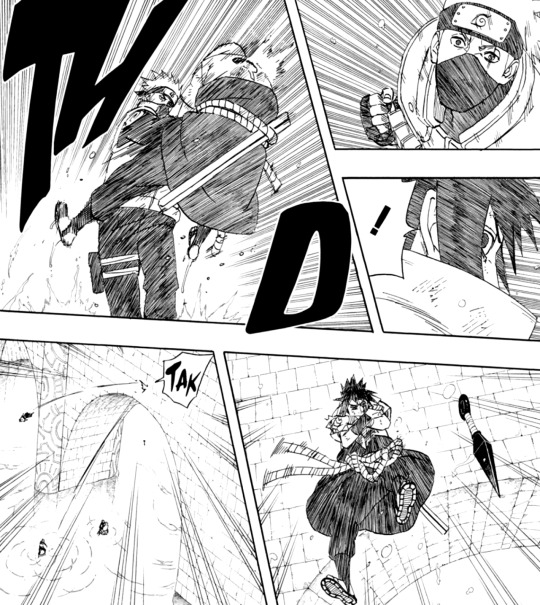
(I know that in fandom people are more likely to be all, “oh, Naruto Good, everybody else Bad,” but I don’t think the narrative frames Sakura or Kakashi as “worse” than Naruto in any way. The story goes out of its way to make it clear how desperately they don’t want to hurt Sasuke and how much they care about him. And [this is just my interpretation, so obviously I won’t claim it as fact], I personally think that Sasuke - Sasuke, who, looking back, can see how lost he was then and how tortured he would have been if he’d gone through with many of his plans - would be grateful to Sakura and Kakashi for making an attempt to stop him when he couldn’t stop himself.)
2) On the other side of this, the fact that Sakura wasn’t able to deliver the killing blow means a lot. Sasuke was incapacitated under that bridge; he was completely at her mercy - but she stopped with the kunai an inch from his back. She couldn’t kill him, even though she knew that he was completely willing to kill her (because he'd attempted to Chidori-assassinate her from behind just a few minutes ago). That’s huge! Sasuke is too out of his head right now to process this or understand it, but later, it's going to matter. She stayed her hand. She spared his life. She loved him too much to hurt him, even when he’d given her every reason to take him down. She hesitated, and he almost killed her for it, but her inability to strike him ultimately gave him yet another chance to come home, another chance to get better, another chance to have a life outside of his pain. Despite everything, some part of her still hadn’t really given up on him, and that knowledge will matter later, when he’s finally able to acknowledge it.
The point of all this is to say that I really have no complaints about Sakura and Sasuke’s dynamic in their S10 confrontation. This season is the point where Sakura fully grows past her “girl with a crush” stage and into her “shinobi must make very harsh decisions” adulthood, but it never means that she doesn’t care about the person she’s trying to take down. Her ultimate inability to deliver the killing blow remains a dangling lifeline for her relationship with Sasuke, an open door that Sasuke is able to walk through at the end of the story (literally, in fact, when Sakura opens that portal for him and saves him from Kaguya’s desert prison, and figuratively, too, when Sasuke apologizes to her).
3. she only wants to save you
The last stage in their relationship is what Sakura settles into during the war arc. She started off Part 1 being just a girl with a crush, then tried to harden her heart and put her feelings for Sasuke aside in service of the greater good, but she was unable to actually follow through and kill him, and because of that, what she’s come to accept by the war arc is actually two things: that 1) Sasuke truly is willing to let her die if it furthers his goals, and 2) she wants to save him anyway.
She has no intention of pursuing Sasuke romantically. She knows full well that Sasuke isn’t interested in her. She even knows that Sasuke isn’t really on their side (there’s a great scene where Sai questions Sakura about Sasuke’s return, and she reassures him that everything is fine, and Sai sadly thinks to himself “even I can tell your smile is fake”). She’s well-aware that Sasuke didn’t try to help her when Madara stabbed her. She’s well-aware that he left her to die in the lava pit. She’s also well-aware that none of this is enough to make her stop loving him. He doesn’t have to care about her - she still cares about him. She still wants to help him. She still wants to save him.
This is not hidden, hard-to-parse character development. It’s explicitly articulated on the page:
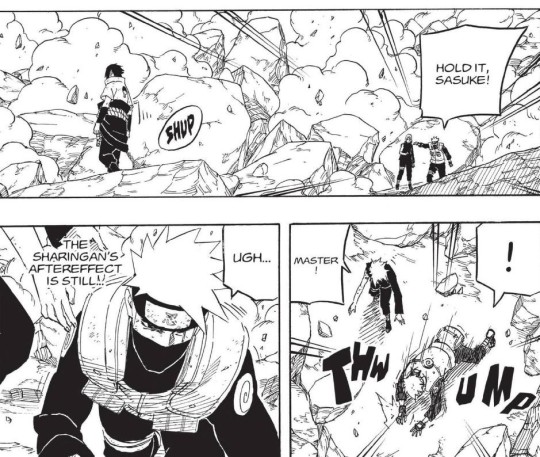
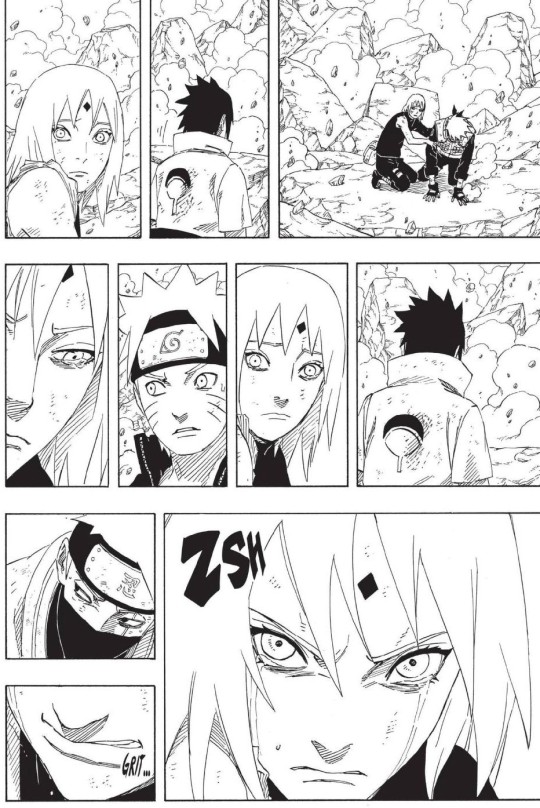
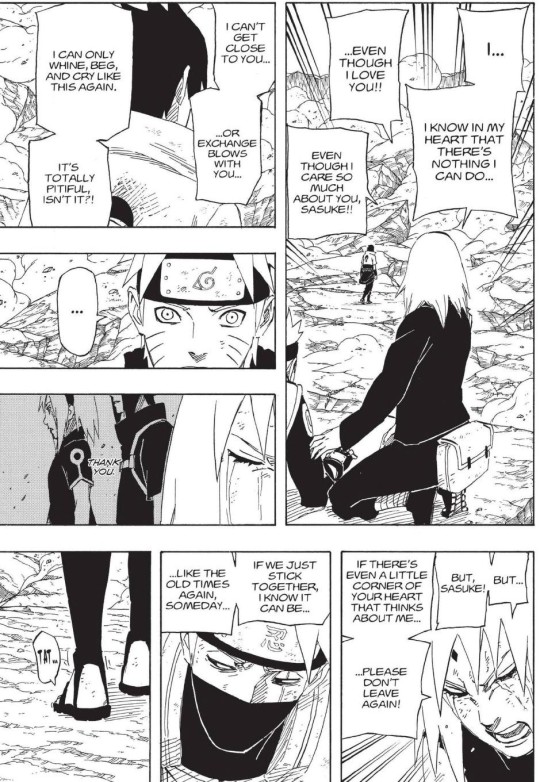
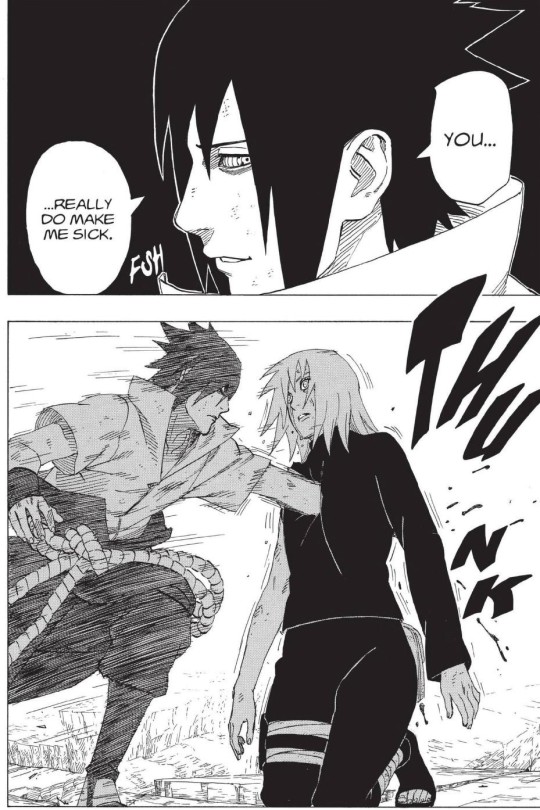
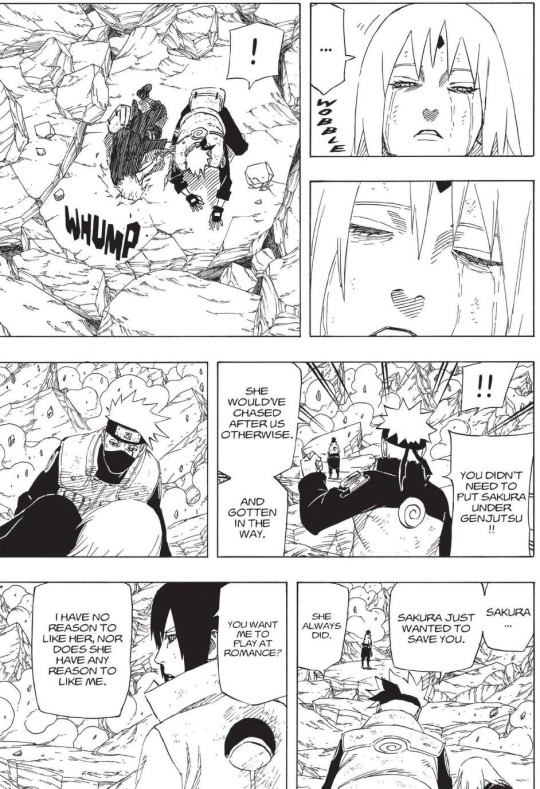
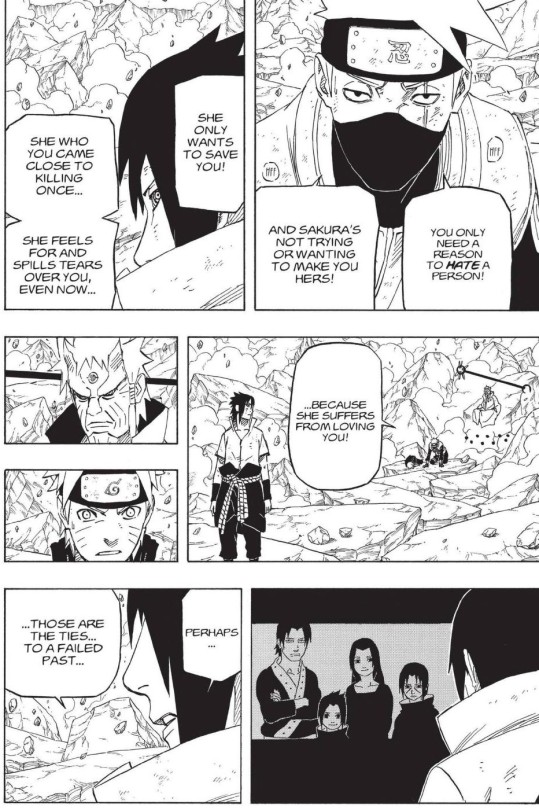
Sakura’s not trying or wanting to make you hers! She only wants to save you.
I’m not sure if people look at this last confrontation and unquestioningly take Sasuke at his word (as if we haven’t just read 71 volumes/watched 700 episodes showing us how how painfully distorted his thinking is), or if they stop reading/watching before the end of the scene, or if they don’t understand that Sasuke saying something doesn’t make that statement an accurate representation of reality. The entire point of this scene is to show us how deeply mistaken Sasuke is about Sakura (and, by extension, the rest of Team 7). He’s locked into a false pattern of thinking. His single-minded focus on revenge and destruction has blinded him to the unconditional love his friends feel for him; he’s become so accustomed to using others and being used that he can’t understand or accept that someone would care about him without needing a reason, without needing him to love them back, without needing to receive something from him in exchange.
Sakura’s not trying or wanting to make you hers! She only wants to save you.
Sasuke matters to Sakura as more than a love interest. He always has. She does love him romantically, yes, but she doesn’t only love him romantically, and her desire to help him is not and has never been contingent on him returning her feelings, romantically or otherwise. Sasuke isn’t able to acknowledge that in this scene, but that doesn’t mean we’re supposed to just sit back and agree with his warped perspective. Kakashi is the one who’s explicitly positioned as the voice of the narrative here. We, as the audience, are supposed to recognize that Kakashi is the one telling us the truth.
[tangential thing 1: You don’t have to love Sakura's last plea to Sasuke here. It’s not my favorite, either - the best part, other than Kakashi’s speech at the end, is the moment after Kakashi collapses when Sakura’s expression changes from pained uncertainty to pure rage, when she grits her teeth together - when I first saw that, I almost leapt out of my seat like “Oh my god. She’s finally going to let him have it. It’s finally happening - ” I wanted that so badly, and I still think it would have been a more effective writing choice for Sakura’s last words to lean more into her anger at the suffering Sasuke is causing all of them (himself included!) and less into yet another of Kishimoto’s “let me have Sakura articulate what a shame it is that she can’t do as much as Naruto despite the fact that I literally just went through a major reveal sequence in the war to show that she’s caught up to the boys; I can’t make up my mind about whether I want her to progress or not” - it’s extremely frustrating (and it's something he does at the very end of the S10 Team 7 reunion, too, which is the ONLY moment of S10 that falls flat for me). But at the same time, even if there are ways this sequence could be more satisfying, it doesn’t change the fact that her plea to him is not remotely motivated by a desire to be with him romantically and not anything to condemn her for.]
[tangential thing 2: I do like how she remembers that moment when Sasuke says “Thank you.” That panel precedes her saying “If there’s even a tiny corner of your heart that thinks about me…” (which I’m sure is one of the things that people like to criticize about this scene, aka “oh she’s sooooo self-centered” etc), but that particular line of dialogue is preceded by that particular flashback panel for a reason: Sakura knows that Sasuke DOES think about her. He thinks about all of them. Sakura remembers that “thank you,” and it reminds her that despite everything Sasuke has done and said since, despite all evidence to the contrary, she knows in her bones that his expression of gratitude back then was genuine. He cared about her once. He cared about all of them. She’s trying to reach the part of him that still does, if it exists.]
[tangential thing 3: The fact that Kakashi says “she suffers from loving you,” and it triggers Sasuke to remember his own family - thinking about how much he suffered (and still suffers) from loving them - “Perhaps…those are the ties to a failed past” - the idea that it’s not worth it to have bonds if it means you suffer this much…that it’s too difficult, it’s too painful, and if Sakura and the rest of Team 7 were smarter they would just give it up (all Sasuke knows how to do now is sever potential bonds before they can hurt him; so why aren’t Sakura and the rest of his teammates doing that, why can’t they let it go, why are they making this so hard - ) << yeah, he clearly doesn't care about her/them at all.]
4. the shadow of my family
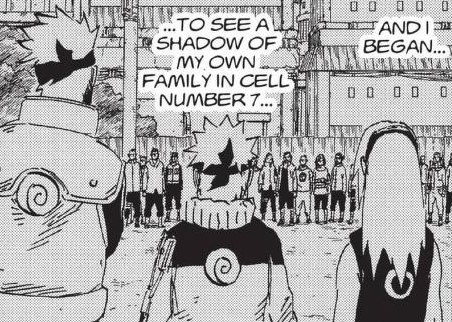
This has all been a really long way to answer the original question, but the short response to “What do you think about the relationship between Sasuke and Sakura?” is “I really care about it,” just like I really care about the relationship between Sasuke and Naruto, just like I really care about the relationship between Sasuke and Kakashi. And I don’t think the story ever asks me to choose between them.
I’m not sure whether it’s the impact of Boruto-era “canon” that gets in the way of other people approaching things this way (I don’t consider sequel material when I evaluate the original story), or if it’s Kishimoto’s frequent disinterest in/disrespect towards female characters, which yes, does sometimes make it harder, or if it's a shipping thing (bane of my existence), or some combination of factors, but for me, taking one member of Team 7 out of the equation hobbles the rest of the story. I can’t read/watch Naruto while hating one of the protagonists and loving the other three. It doesn’t work like that for me. The story wasn’t written that way, and there’s nothing in the text that would cause me to receive it that way.
That doesn't mean there's anything wrong with disliking one of the main foursome (or any character, for that matter) - obviously we're all going to have different preferences, and everyone is free to enjoy or reject whatever parts of a story they want, or to like or dislike whatever characters they want. I know that some people have more fun disregarding canon and doing their own thing, which is fine. My own personal zone of enjoyment comes from receiving the story as closely to how I think it was intended to be read as I can, and personally, when I look at this particular story, what I see is that all the members of Team 7 clearly demonstrate their love for Sasuke in ways that he himself later recognizes and acknowledges. All of them are driven by their desire to save him and their unwillingness to hurt him. All of them make repeated choices to chase after him when he runs away, to trust him when he hasn't exactly earned it, to give him another chance when he doesn't appear to deserve it. ALL of them, not just Naruto, do these things multiple times throughout the story, and Sasuke owes his life (and thus his eventual recovery) to ALL of them, many times over. Kakashi disobeys Hokage-elect Danzō and breaks the law to negotiate for Sasuke's life with a foreign head of state. Sakura and Kakashi both have opportunities to kill Sasuke in the Land of Iron, and they choose to spare him instead. Kakashi stops Sasuke from killing his only friends at two different points in the story, which would have been a mistake Sasuke couldn't have recovered from. Sasuke would have died in Kaguya's desert dimension if Sakura hadn't saved him (Sakura, who knew that Sasuke wasn't even truly on her side yet, who knew he'd abandoned her for dead multiple times already that day). Kaguya's bone bullet would have killed Sasuke too, if Kakashi, with his intention to die in Sasuke's place, hadn't leapt in front of it (Kakashi, who also knew that Sasuke wasn't fully on their side yet, who also knew that Sasuke had abandoned him for dead earlier that day). Sasuke and Naruto would have BOTH died in the Final Valley if Sakura and a severely injured Kakashi hadn't chased after them to heal their injuries.
Remove any one member of Team 7, and Sasuke never makes it home. Without the combined efforts of all three of his teammates, he doesn't survive. That’s the way it should be, thematically, for a story whose first and most foundational premise was the importance of teamwork, and since Sakura was just as essential to that framework as everyone else, I’m just as invested in her relationship with Sasuke as I am in his relationship with everyone else. You can’t remove one leg from a four-legged stool without damaging the integrity of the entire structure, and for me, discounting any single member of Team 7 irreparably damages the integrity of the entire story.
TL;DR: I love all of the Team 7 relationships, including Sakura and Sasuke's, because despite what some segments of fandom seem to believe, the text of the story never gives me any reason not to.
#naruto#meta#replies#anyway that's that! hopefully that is a helpful answer#thank you for the question! i honestly don't think i would have ever gotten around to writing about this if i hadn't been directly asked#i love talking about the stories i enjoy (obviously; we all do; that's why we're here)#but i'm usually ¯\_(ツ)_/¯ about responding to takes that blatantly misread the narrative to justify hating a particular character or ship#mostly because a) it's whatever. as long as people mind their own business and leave me to enjoy myself they can do what they want#and b) some opinions are so divorced from the actual text that they're not worth discussing#like. what's the point of responding to random internet posts saying that sakura was selfishly pursuing sasuke as a lover the entire time#when that is textually and provably not the case?#if you're that committed to experiencing things in direct contradiction to what the narrative is asking of us then just go ahead#is it mildly annoying to me? sure. but so are lots of things and it's better to just let stuff go#like - i initially planned to take this piece of meta all the way up through sakura and sasuke's last scene together#the one where he tells her 'maybe next time' and finally reclaims and redefines itachi's forehead tap (INCREDIBLE. THIS SCENE.)#but ultimately i changed my mind because everything i wrote for that last section was coming out too harsh#i generally prefer to talk about fandom stuff in a chill/friendly approachable way#but i kept thinking about the most obscenely & disrespectfully inaccurate read of that scene i'd ever seen#and i couldn't figure out how to talk about it in a non-scathing way#that scene and the one where naruto gives sasuke's headband back are the ONLY well-written things about the finale of naruto#they are SO perfectly constructed and i can't respond to people slandering either one without feeling an urge to kill#so i just deleted it. partially because again - this is fandom; it's not that serious; people can do what they want#but also because i know i get extra frustrated about people picking over the text and plucking out isolated bits and pieces#to contort into blatantly misinterpreted mutant shapes that 'confirm' whatever pre-existing judgments or ships they had#instead of experiencing the story as a cohesive whole & keeping in mind the greater context of what it's always been trying to communicate#people on this website say 'we all interpret things differently :)' as if it means no one can ever be wrong about what a text is saying#newsflash: not all interpretations of a text are valid. things can't in fact mean whatever you want them to mean.#the ***story*** persists and exists even if the author is dead to you#if you choose to ignore that then that's fine; it's just fandom; who cares. but i'm not going to pretend you're 'analyzing' anything.#(ok now i'm really done. you can see why i deleted this section XD)
43 notes
·
View notes
Note
How was yellow journalism at the turn of the 19th century different then the fake news and media insanity we see today? Do you know? It seems like this has been going on for a really long time.
And you would be correct, because this has in fact been going on for a very long time (indeed, much further back than the 19th century) and is essentially the basic practice of history: figuring out how to understand, vet, classify, believe, and treat the stories that humans tell about themselves. Or as that musical that came out the other day put it: “you have no control who lives, who dies, who tells your story.” We’re all just telling stories about things constantly, and we all want people to believe our story and treat it as the best version. Some of these stories are more fictional (and more harmful) than others, but it’s been going on for as long as there have been people.
(Or: “A Brief History of Fake News” follows below. If it doesn’t make sense, blame the fact that I had to rewrite half of it after Tumblr ate it.)
Globalization and the 24-hour news media has made it possible for “fake news” narratives to become transnational: in other words, no matter where you are in the world or what country you’re originally from, you can use some of the same content, techniques, arguments, or beliefs. For example, coronavirus deniers, no matter where they are in the world, can use the same stable of arguments: it’s fake, it’s a Chinese lab conspiracy, it’s a political stunt, it’s not that bad, you shouldn’t wear a mask, etc. They are drawing from the same essential pool of content and replicating the same themes in their particular contexts. Obviously, everyone has instant access to these narratives now and we are seeing the large-scale and damaging effects, because they can be amplified to a degree unheard-of in human history thanks to social media, TV, phones, etc, but also: it’s what humans have been doing since, well, forever.
A caveat I often have to give undergraduate students, when introducing them to medieval chronicle sources, is that they’re subjective -- that is, they’re more interested in promoting one individual, kingdom, religious viewpoint, version of events, etc, rather than aiming for an inclusive and “real” version of how things went by taking into account the experiences and arguments of all sides. This is obviously disingenuous, because it suggests that modern historians don’t do this, that they just objectively report “real facts” and there is no human bias or agenda at work in producing the result. This reflects the influence of Leopold von Ranke, a 19th-century German historian who is often viewed as the founder of the modern critical source-based historiographical method. He was a proponent of the idea that historians had to “describe the past as it actually happened,” i.e. they had to select the correct facts and build an objective narrative so that people could discover the One True Version of reality. Of course, you may realize that you.... can’t actually do that.
Historians still have to select which facts they report, how a “fact” is constructed to start with, what methodology they use, what conclusions they draw, what they focus on, what moral lessons or overall takeaways they present for their audience, etc. This reflects the 19th century’s effort to make history similar to hard science: they liked the idea that there was one single methodology that would reveal an empirically provable single ideal, that there was no human agency or bias that would influence this narrative, and the facts would magically assemble themselves into one central version that everyone would agree upon. Except this still isn’t and has never been the way it works. Historians, as human agents, mediate and manage and influence the facts they use and the conclusions they draw from sources, and it’s our job to figure out which ones are more valid and which ones are not. It’s a system of collective memory, and as I’ve said before, that collective memory is always particularly susceptible to what people (especially the rich and powerful people, who install the version of history that the rest of us learn) want to remember. This rarely includes their flaws, or things that show them to be wrong, or any challenge to their status.
Prior to the invention of film/TV/audiovisual methods in the 19th century (and since they didn’t become commercial or widespread until the 20th), everything we know about human history before that, we know because someone wrote it down. In the Western tradition, the ancient Greek historians Herodotus and Thucydides are often viewed as the “fathers” of history, because they deliberately assembled a curation of (allegedly) empirical facts in a constructed narrative with a self-stated historiographical purpose. They also make use of what, in fancy academic-speak, we might call the “topos of authority.” Every single historian has been aware that they have to provide some way for their reader to independently verify their content, or decide to believe what they’re saying against a competing version. In the olden days, they often did this by self-certifying: “I swear that everything I write here is true/I heard only from wise and trustworthy people/I spoke to an eyewitness of these events/I read a book by such-and-such authority.” But just because they SAY these things doesn’t mean they’re true, and no modern historian can take this at face value: they can’t just say, “well, my source said they were telling the truth, so that’s good enough for me.” They have to supplant with other accounts, they have to perform textual criticism and close reading, they have to find other pieces of evidence to compare. Because in a sense, all of history might be fake news. We just have to figure out which parts those are, and sometimes that’s not even the point, because it’s impossible.
For example: take the sixth-century Byzantine court historian Procopius, who wrote about the reigns of the Eastern Roman Emperor Justinian (r. 527-65) and Empress Theodora (r. 527-48). All of his official accounts of them are largely positive and flattering. But Procopius is probably best known for a work called the Secret History, where he rips into them as horrible awful people, relates lurid sexual scandals (especially about Theodora), dishes on all the bad things they did behind the scenes, so on and etc. This means that historians have been arguing ever since about which versions of Justinian and Theodora -- indeed, Procopius’s own versions of them -- we’re supposed to believe. If you want to read the Secret History, which you can do at the link above and which you should because it has amusing chapter titles like “Proving That Justinian and Theodora Were Actually Fiends in Human Form” and “How Justinian Killed a Trillion People,” you’ll come across this unrelentingly negative depiction of them, and... what? Is this a (somewhat) accurate account of the darker side of Justinian and Theodora’s bad behavior, written by an embittered Procopius after he fell out of royal favor? Is it just a total hatchet job? Was it written purely in case there was a palace coup, so Procopius could hand it to the new emperor and be like “see, I totally didn’t like those losers either, you can rely on me” and didn’t represent his actual views on the imperial couple at all? You can already see the problem if the idea is, a la von Ranke, to prove “what really happened.” Almost nobody treats the Secret History as a straightforward factual document, but they also disagree about how truthful it is, why, for what reasons, and whether it is, in fact, even a History per se.
To return (belatedly) to the idea of newspapers and yellow journalism particularly. I would say that there was no more significant event in all of human history (well, maybe a few, but not many) than the invention of the printing press in the mid-fifteenth century. It instantly and permanently transformed the way humans acquired, stored, recalled, and learned knowledge, and it lasted (and is still lasting) even in the face of smartphones and internet. Once books were no longer rare, labor-intensive, and expensive, their use exploded, it became standard practice to publish your research (by the sixteenth century, this was already happening), to learn from a book, to use other books in constructing your knowledge, and thus to encounter these narratives. The other architecture of a culture of public and general literacy developed along with it, until it was the primary medium in which all people, not just the rich and educated, learned about things. Newspapers and books and pamphlets and other printed material intensely drove the revolutions of the eighteenth century, both in America and in Europe. And obviously, these weren’t trying to tell “both sides of the story.” It became standard practice to publish your manifestos, your papers, your essays and arguments, all your supporting documents, and you were trying to convince people to your side for concrete political reasons.
So by the time you get to the 19th century, you’ve had literal CENTURIES of people deciding what they want to believe, what’s beneficial for them to believe, their viewpoint on the world, etc. Except as we discussed above re: our friend Leopold von Ranke, the 19th century develops the idea of “scientific objectivity.” Of course, in the social sciences, this often gets applied (pause for sighing) to support the idea that there is a real racial hierarchy, that western European white men are the best not because they said so, but because it’s science, it’s provable, it’s not just an opinion, It Is Trufax. Newspapers, books, and other printed material are widely available to everyone, and the 19th century is making claims to universal truth that can be discovered and applied in all disciplines, but which is just a continuation of the same subjective storytelling as before, now elevated to the status of Unimpeachable Truth. Yellow journalism isn’t really that different from what humans have always done in crafting a narrative that supports their purposes and the story they want to tell (or that they think will sell papers, because people have an endless appetite for secrets, scandals, and drama, especially if they think there is a conspiracy, real or fake, to hide it from them). They just have different tools for doing it. Of course in the 21st century, we now have journalistic ethics and a set of standards and codes of conduct for how you’re supposed to write these things, and we have respected publications that do all that, but we also still have tabloid media, when the relationship with the facts is... tenuous, at best. These institutions and tendencies never go away. They just evolve.
I realize that this was a long and rather dull ramble about the origins of historiography, but the point is this: “fake news” is literally as old as humanity and history itself, and humans have always been predisposed to select and believe the narrative that personally benefits them, fits with their ideology, makes sense of events in the way they feel is most compelling, and so on. It’s just now in the hyperconnected 21st century, “fake news” can go instantly around the globe and be exposed to anyone with an internet connection. This is not helped, as I talked about in my “death of expertise” ask, by a public forum where everybody’s contributions supposedly have to be treated “equally,” in the name of “fairness,” no matter whether someone knows anything about the topic or not. So the impact of this tendency to believe whatever the hell anyone wants has been magnified far past what has ever been the case in history before, because no matter what someone wrote or believed in the pre-internet era, they didn’t have the multi-million-exponential ability to reach absolutely everybody at once. Even print books have to be printed, circulated, purchased, read, etc, and that takes time and money, rather than just instantly having it appear on your smartphone. And we are obviously seeing the real-world consequences of that as a result.
66 notes
·
View notes
Note
Hello. I'm going through a very rough breakup right now (broke up three months ago, still not over it) that is partially my fault, partially not. at this point she has me blocked on everything, deleted things that we used to share joy in (her tumblr and pinterest) and we no longer write together. I am without a doubt in love with her and I don't think I'll ever get over her. Are there any characters or stories from Shakespeare that I could relate to? Anyone who never gets over someone? thank you
I’m very sorry to hear you’re having a difficult time.
I don’t know if it will be any consolation to you, but heartbreak and unrequited love is something people have felt for as long as literature can attest to and Shakespeare is one of them. In fact, Shakespeare is full of people who can’t get over the people they love, so I can easily answer your question.
In the ones that end happily (or reasonably so):
Helena in A Midsummer Night’s Dream is in love with Demetrius, who she used to have a relationship with.
Another Helena, this time in All’s Well that Ends Well, is unrequitedly in love with Bertram, and can’t get over it (I wouldn’t take her approach as a good example though).
A slightly different situation, but Viola in Twelfth Night is in love with Orsino, even though he’s in love with Olivia, and she can’t get over it. There are some characters, like Orsino, who do get over their love in this play, but there are also more tragic situations, like Antonio, who doesn’t ever seem to get over his love for Sebastian.
The Winter’s Tale contains the sad plight of Hermione, who endures a lot of cruelty from her husband Leontes; it isn’t just about the love between couples in this case, but the fact that she loses her husband’s love, and her reaction to it makes this a very interesting case.
Cymbeline This is a great one. Innogen is an amazing character, and her persistence in her love for Posthumous despite his cruel treatment of her is one of the best examples I can think of. Especially the scene where she thinks he’s dead.
Bonus: Julia in The Two Gentlemen of Verona. I’m including it because she never gives up even when her beloved has essentially left her, but the denouement makes this play rather too complicated and uncomfortable.
Another Bonus: Hero in Much Ado About Nothing. Bonus because it’s not a large part of the play and because the fact that she continues to want to marry Claudio is not fully fleshed out, because she’s not the main plot. Some might include Beatrice as an example, but that would require the interpretation that her anger towards Benedick is a bitter cover for the love that she still feels for him (not easily textually provable).
In Tragedies:
Romeo and Juliet is an obvious one, in the sense that even death won’t get in the way of love for the two titular characters, though it’s different to a breakup situation.
Antony and Cleopatra, both lightly mocking and sympathetic in its portrayal, shows a love that neither side can quite overcome, in spite of both sides acting at times terribly to one another. It shows how illogical love is, how powerful, and how, sometimes, cruel.
Another somewhat obvious one is Ophelia, in Hamlet. Her madness is caused by many different factors, but as her love songs make clear, her inability to get over her love for the man who treats her cruelly and who killed her father is one of the key factors to her madness. It’s one of the more poignant moments in this play, as the general obsession with such a small role shows.
Othello, because Desdemona continues to love Othello in spite of everything. As he threatens to kill her on their bed, telling her it is ‘thy death-bed’, she answers ‘Aye, but not yet to die’ (5.2.53-54), imagining that she will die on her wedding bed after a long life spent with her husband. And even after he has strangled her, she manages one last lie to try to absolve him when Emilia asks who did it by answering ‘Nobody - I myself’ (5.2.124).
Bonus: Troilus and Cressida. Features a romantic betrayal and heartbreak, but whether Troilus remains as true to Cressida or continues to love her is… Not the easiest thing to discern. It should be an obvious one, with Menelaus fighting for his wife, and with Troilus’ situation in love, but the way Shakespeare tells the tale, it really isn’t. As wonderful as the play is in many ways, I might give this one a miss because it’s not an easy one to relate to.
Poetry:
Venus and Adonis this one is interesting. It’s painted in a generous but lightly satiric tone, so maybe not the kind of poignancy you’re looking for. Still, the ending is quite beautiful, and in the sense that it features the goddess of love herself failing to get a response from the one she’s in love with, it fulfils the criteria well.
The Sonnets. If you want unrequited love and love that continues in spite of the other person’s indifference, the sonnets are for you. They’re hard but worthwhile.
In fact, if you’re looking outside of Shakespeare then Petrarchan sonnet sequences and Petrarchan poetry generally are about unrequited love, like Petrarch’s original sonnet sequence. Sidney’s Astrophel and Stella is a good English non-Shakespeare example; single poems include Wyatt’s famous ‘They flee from me’.
I won’t say you’ll get over your love, but I hope you feel better soon. Hard breakups only happen because it meant something, because it was a relationship worth having, and whatever happens I hope you treasure that for the rest of your life.

#love#anon anon sir!#long post#asks#there are some other characters who might just about count in this category but I haven't included them for one reason or another#Like Margaret in HVI#Or the Queen in RII#Sorry if my explanations are dry and scholarly
35 notes
·
View notes